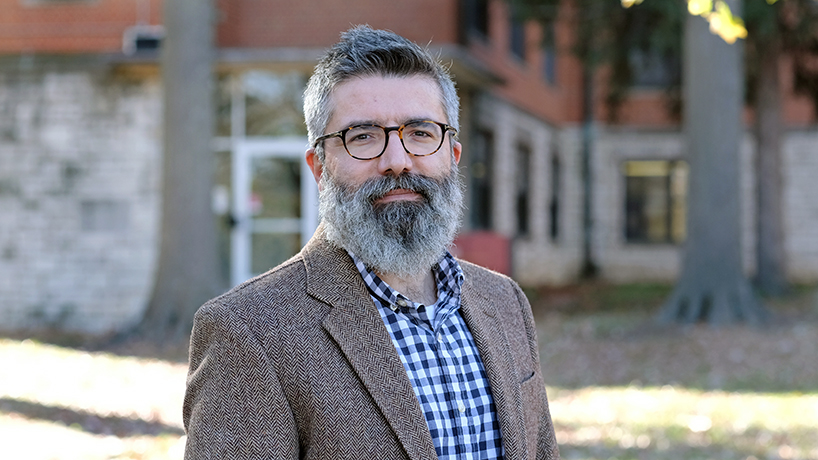
College of Nursing Assistant Professor Umit Tokac develops artificial intelligence to recommend treatment plans for veterans experiencing PTSD. (Photo by August Jennewein)
Every aspect of Umit Tokac’s academic background proclaims his interest in math.
The University of Missouri–St. Louis assistant professor first opted into that path while in high school in Turkey, where students choose between quantitative or qualitative studies. From there, he earned a BS and an MS in math education from Gazi University in Turkey and then became a high school math teacher.
Deciding he wanted to know more, he immigrated to the United States, earned an MS in educational statistics and research methods and then a PhD in statistics from Florida State University and became a data analyst for Pearson Assessments.
Which is all a long way of saying that you’d probably expect to find him in a department such as mathematics and statistics. Prepare to be surprised.
After one year as an assistant research professor at the Missouri Institute of Mental Health, Tokac has made his home at UMSL in the College of Nursing, teaching statistics to nursing students.
“It’s a perfect position for me,” he said. “What I do in my course is that I teach how to use statistics in daily life. To ask the question in their minds, for example, for any kind of treatment they apply, any kind of pharmaceutical pills or medicines, how that affects their patients, how they can analyze those kinds of results.
“Of course, I provide them the background of statistics, but I also teach them how to apply those methods. I believe that this helps students not only get over their bias about statistics, but I also believe that it’s more useful, and they can do something good for the public, for society.”
In addition to teaching, Tokac has made health care – specifically Post-Traumatic Stress Disorder treatment in veterans – his main research interest. At October’s Virtual Early Career Research Symposium, he presented his latest project “Deciding a Treatment with an Artificial Intelligence for Veterans with Post-Traumatic Stress Disorder.” In 2019, Tokac won an UMSL Research Award of $8,931 to support this work.
Tokac first got interested in studying treatments for PTSD while at MIMH thanks to collaborations with investigators such as Associate Research Professor David Tate, who was working on traumatic brain injury and PTSD, and Kimberly Werner, who is now the associate dean of research in the College of Nursing.
“I saw how much people are struggling with these mental health problems and how much those problems are affecting their everyday lives, especially for the veterans,” Tokac said. “Always in my life, I like to help people. I wanted to create a product that would help people. That’s why I was interested in PTSD.”
He wanted to create an artificial intelligence computer program based on a partially observable Markov decision process, a probabilistic and sequential model that comes from mathematics. For the project, he’s collaborating with the Harry S. Truman Memorial Veterans’ Hospital and supervisory psychologist Andrew J. Darchuk.
Once operational, a provider will feed background information – such as demographics, past treatment, adherence – into the program, which will produce probability statements about how successful different treatment methods would likely be.
“This AI program is going to say that like, if you apply treatment A to the person X for two months, you will have a 60 percent chance to get a high benefit,” Tokac said. “Or if you have treatment B to the person X for the same amount of time, your success to get over PTSD is going to be 30 percent, for example.”
The provider could then take that data into consideration when devising personalized treatment plans.
Tokac has already created a compiler for the AI program, but he needs patient data to teach the program which recommendations to make. Once he has Institutional Review Board approval from UMSL and Truman Hospital, the process of inputting data should be swift. After that, all that’s left will be fine tuning with the clinicians.
“I get really great support from my collaborator,” Tokac said. “I’m thinking in the future for all VA hospitals to commission the use. I hope that it is really beneficially for the patients and helps minimize symptoms and helps them at a really low cost.”
He hopes eventually to be able to provide the program to any hospital that treats PTSD patients.
Beyond that, Tokac plans to create a similar program for a set of related mental conditions, personality disorders. He’s also working on projects examining how COVID-19 affects mental health and work life for nurses as well as, in collaboration with the UMSL Veteran’s Center, research on student retention of veterans during and after the pandemic.
“My long-term goal is trying to find factors that cause them to quit from their programs and create a new instructional system to give them the support they need to complete their programs successfully,” he said.
Aside from research, Tokac has some longer-term goals, including simply to stay in St. Louis and at UMSL.
“My students, they are so nice, and I like to teach them,” he said, explaining he’d turned down other job offers in order to stay at UMSL. “I’m respected, and if the College of Nursing believes that your research idea is great, and you are really ambitious about it, you get a lot of support from the college. I feel like I’m working with family.”














